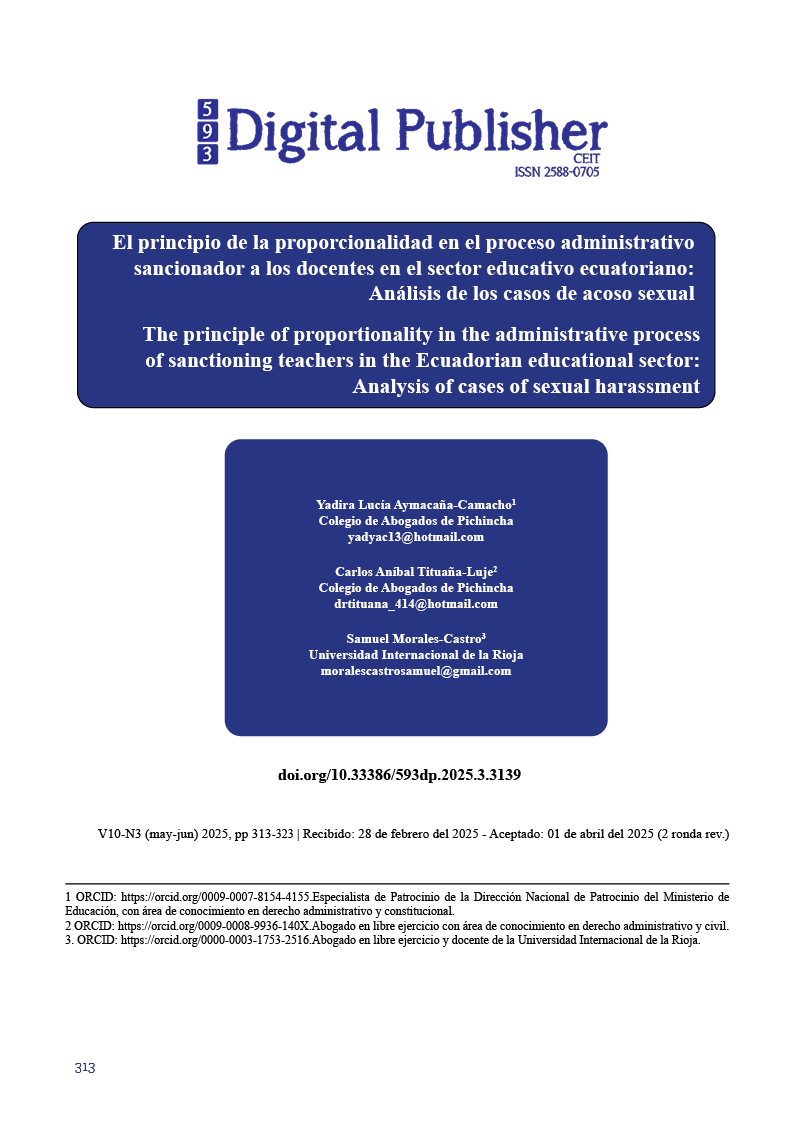The principle of proportionality in the administrative process of sanctioning teachers in the Ecuadorian educational sector: Analysis of cases of sexual harassment
Main Article Content
Abstract
This article examines the application of the principle of proportionality in administrative sanctioning processes against teachers who have committed sexual harassment infractions in the Ecuadorian educational sector. Based on the normative and comparative analysis, insufficiencies are identified in the implementation of this principle, which affects due process and justice in the sanctions imposed. The research uses a qualitative and analytical approach, evaluating national legislation, such as the Organic Law of Intercultural Education (LOEI) and its regulations, relevant rulings of the Constitutional Court of Ecuador, and international frameworks such as the Convention of Belém do Pará. The results show inconsistencies in the proportionality of the sanctions applied, with cases in which these are disproportionate in relation to the seriousness of the infractions. It is concluded that it is necessary to reform adversarial procedures from a restorative justice perspective, promoting more effective protocols for the prevention and punishment of sexual harassment. It is proposed that educational institutions adopt awareness campaigns and clear protocols for the prevention of harassment, guaranteeing adequate application of the principle of proportionality in conflict resolution.
Downloads
Article Details

This work is licensed under a Creative Commons Attribution-NonCommercial-ShareAlike 4.0 International License.
1. Derechos de autor
Las obras que se publican en 593 Digital Publisher CEIT están sujetas a los siguientes términos:
1.1. 593 Digital Publisher CEIT, conserva los derechos patrimoniales (copyright) de las obras publicadas, favorece y permite la reutilización de las mismas bajo la licencia Licencia Creative Commons 4.0 de Reconocimiento-NoComercial-CompartirIgual 4.0, por lo cual se pueden copiar, usar, difundir, transmitir y exponer públicamente, siempre que:
1.1.a. Se cite la autoría y fuente original de su publicación (revista, editorial, URL).
1.1.b. No se usen para fines comerciales u onerosos.
1.1.c. Se mencione la existencia y especificaciones de esta licencia de uso.
References
Alberti I Cortés, Pedrol Llirinós. El enfoque restaurativo en el ámbito educativo. Cuando innovar la escuela es humanizarla. Educación Social, Revista d´Intervenció Socioeducativa, 2017, página 48-57.
Alexy, R. (2003). Teoría de los derechos fundamentales. Centro de Estudios Constitucionales.
Asamblea Nacional del Ecuador. (2021). Ley Orgánica de Educación Intercultural.
BOE. (2021). Ley Orgánica de Protección Integral a la Infancia y la Adolescencia Frente a la Violencia. Boletín Oficial del Estado.
Centro de Derechos Reproductivos. (2020). La educación integral de la sexualidad: asignatura pendiente en Ecuador después de la sentencia. Recuperado de https://reproductiverights.org/caso-paola-guzman-albarracin-despues-de-la-sentencia/
Cevallos, P., Andrade, X., & Martínez, L. (2024). “Nadie dice nada”: Percepción de estudiantes sobre el acoso sexual universitario en Ecuador. Recuperado de https://www.researchgate.net/publication/380285300_Nadie_dice_nada_Percepcion_de_estudiantes_sobre_el_acoso_sexual_universitario_en_Ecuador
Congreso de Colombia. (2013). Ley 1620 de 2013.
Corte Constitucional del Ecuador, Sentencia No. 376-20-JP/21 – El acoso sexual en la comunidad educativa de 21 de diciembre del 2021, pp. 28, 29, párrafos 128, 129, 130, 131, 132, 133, 134, 145, 146.
Corte Constitucional del Ecuador. (2021). Sentencia No. 376-20-JP/21. Recuperado de https://www.corteconstitucional.gob.ec/sentencia-376-20-jp-21/
Corte Constitucional del Ecuador. Sentencia No. 1285-13-EP/19 de 4 de septiembre de 2019, párr. 28.
García de Enterría, E., & Fernández, T. R. (2013). Curso de Derecho Administrativo. Civitas.
Hernández, P. (2020). “El principio de proporcionalidad en el derecho sancionador”. Revista de Derecho Administrativo, 56, 45-67.
Human Rights Watch. (2024). Ecuador: lentos avances para acabar con la violencia sexual en las escuelas. Recuperado de https://www.hrw.org/es/news/2024/07/24/ecuador-lentos-avances-para-acabar-con-la-violencia-sexual-en-las-escuelas
Ley Orgánica de Educación Intercultural, recuperado de lexis.com.ec
MINEDUC (2020). Protocolos y rutas de actuación frente a situaciones de violencia detectadas o cometidas en el sistema educativo.
Organización de los Estados Americanos (OEA). (1994). Convención Interamericana para Prevenir, Sancionar y Erradicar la Violencia contra la Mujer “Convención de Belém do Pará”. https://www.oas.org/juridico/english/treaties/a-61.html
Pazmiño, R. (2019). “Desafíos del proceso sancionador en Ecuador”. Revista Jurídica Ecuatoriana, 12(2), 98-115.
Reglamento a la LOEI, recuperado de lexis.com.ec
Véliz, C. (2021). “Revictimización en procesos administrativos de acoso sexual”. Derecho y Sociedad, 28, 77-89.





